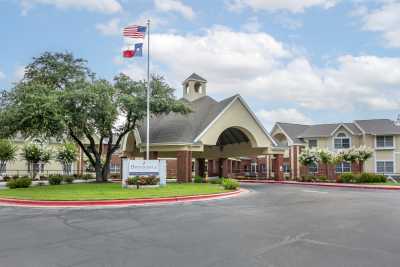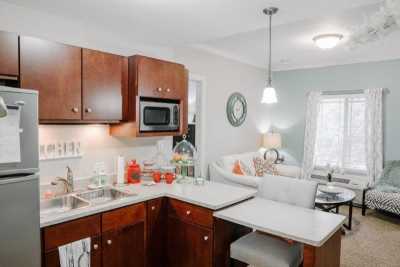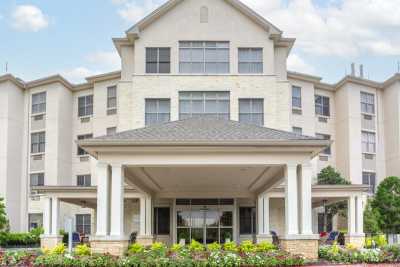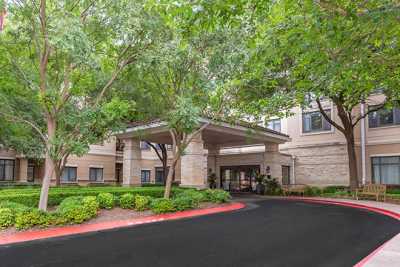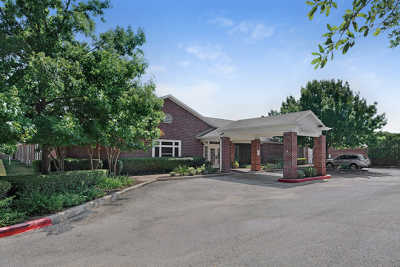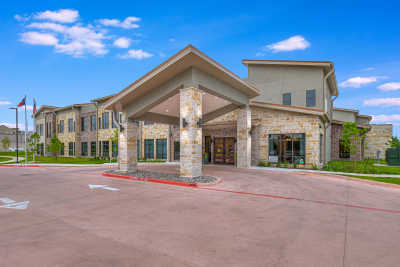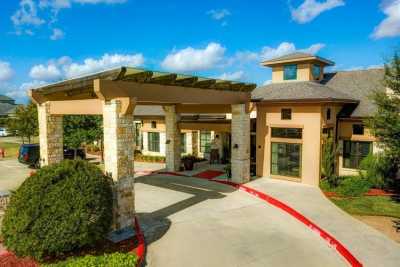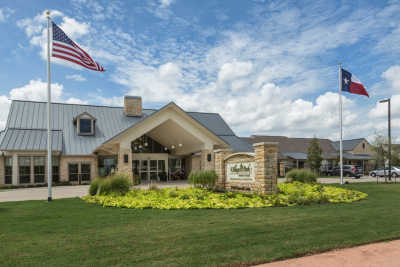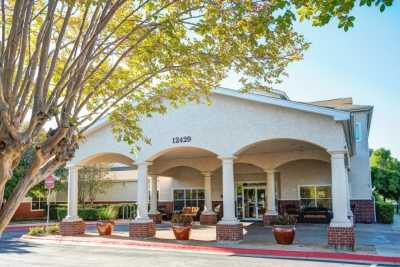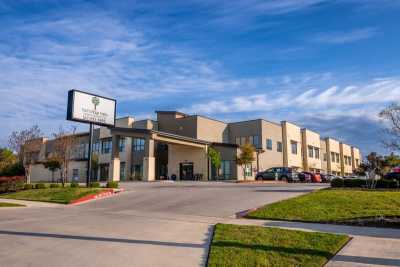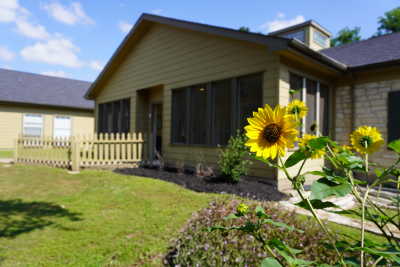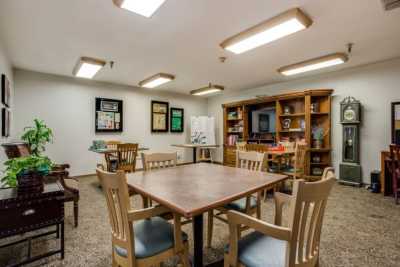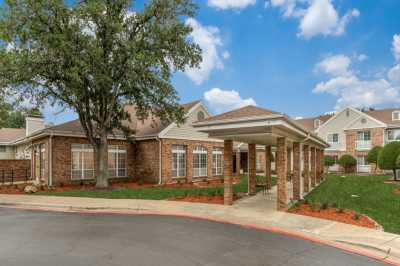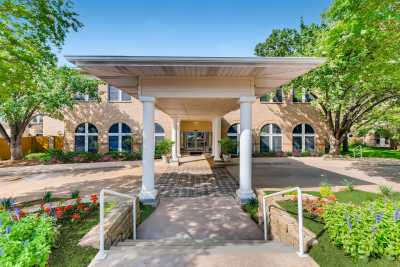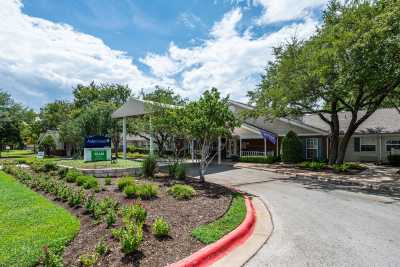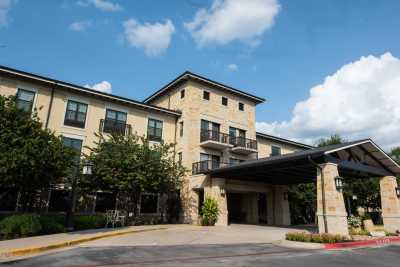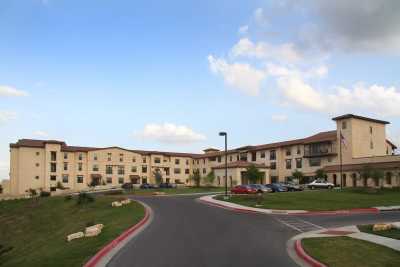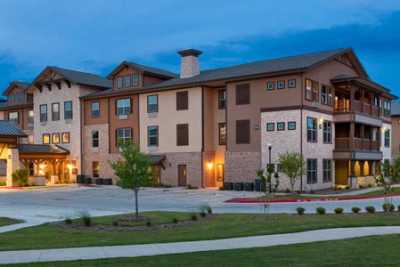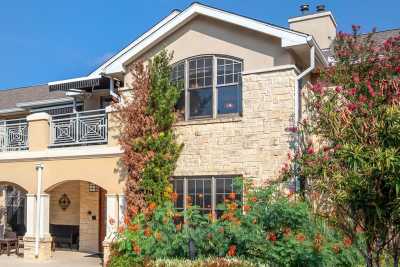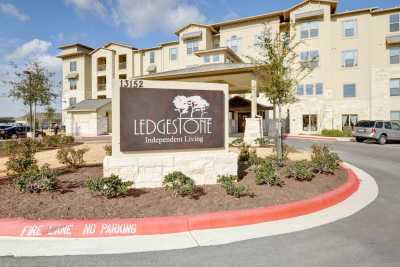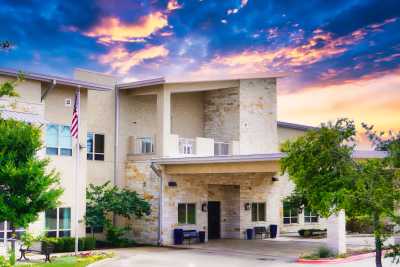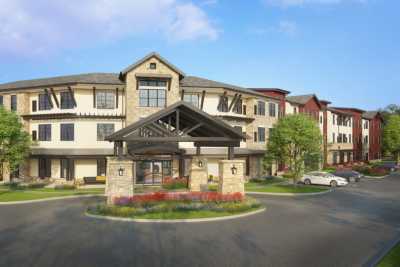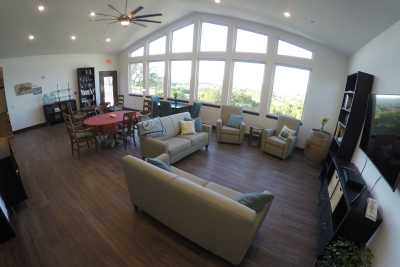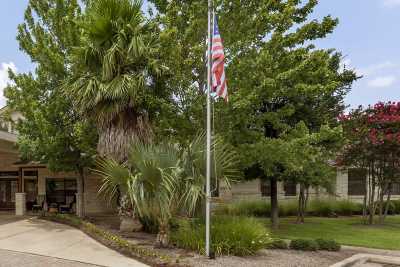
10 Best Memory Care Facilities in Austin, TX
Austin has become a unique retirement destination for Texas seniors. The city attracts seniors with its year-round warm weather, tasty treats, and live entertainment. Meanwhile, the robust senior living scene helps seniors choose a suitable place for their next chapter. A Place for Mom partners with 20 memory care facilities within a 10-mile radius of downtown Austin, making it attractive to seniors with memory loss.
Memory care communities offer a personalized senior living option for seniors with dementia. With intentional design features, person-centered care services, and specialized memory care programming, these communities are equipped to care for seniors in early and late stages of dementia. On top of robust memory care services, these facilities also offer assisted living care services, like assistance with activities of daily living, medication management, dining plans, and more.
In this guide, you’ll find robust local data on memory care costs, payment tips, Texas memory care regulations, senior-specific stats, senior resources, and dementia-friendly activities to help you narrow down memory care options for your loved one. You’ll also be able to categorize communities by what matters most to you and your loved one.
Austin Memory Care Facilities | 1167 Reviews
[name removed] and [name removed] in assisted living are some of the most caring and decent people I have ever met! All the staff touch exceptional care of my mom.
It's a 4. Would be a 5 but they appear to be understaffed and the common area carpeting needs cleaning to remove spills and spots and overall dinginess. Very nice mgmt however. Quick to respond. Yes, I would...
Brookdale NWH is a perfect place for my mother. We are very happy with the care she receives. My mother is well taken care of. The caregivers are kind and compassionate. She has a spacious room and the food...
Very attentive, great follow-up to concerns identified by residents. What stuck out was the condition of apts. Indoor pool. Relationships between staff and residents
What we like the most about Anointed Senior Living is that the staff is always pleasant and show concern for the residents. They are responsive to our requests and provide good communication. Yes, we...
Brookdale North Austin has been such an amazing community to my mother. Not only do they provide outstanding care to their residents, but they also don't have high turnover, so you know who's caring for your...
The administrative staff is good and helpful. The director is Good to work with and on top of things - they are good. The workers are ok. You know how that goes. Most of the women do a good job. The men are...
What they could improve on would be doing the laundry more often, but yes we would recommend this community to other families based on the experience we have had so far.
We have lived here 6 years. It is not like home, but there comes a time in our life when we have to make adjustments. The Village seemed to fit our needs better than any others which we saw. It is close to...
Love the idea that they offer numerous activities daily. And they encourage The clients to be involved. Of course I wish it wasn't so expensive. But they are all very expensive. But some are more expensive...
Our free advisors can help
- Compare local facilities
- Determine care type
- Schedule tours
- Evaluate pricing
All good so far. It is Seemingly well managed and generally courteous and helpful staff. Good service in regard to housekeeping.
Sodalis is a warm and inviting facility. The staff is friendly. The residents seem to be happy and content. The food is good. The facility is clean. It is the only facility I toured that I would consider...
The staff is courteous. There are plenty of activities. When I checked it had the lowest price of any facility in Austin. The sales representative is courteous kind and willing to help out prospective...
Whenever I call my questions and inquiries are always answered quickly....Room size is great I can't really answer about the activities because [name removed] doesn't participate in any. And the food not...
I know that Asher Point recently acquired this property and I can see how they are making every effort possible to make it appealing. The staff is very friendly and accommodating. My friend is in assisted...
The ladies and gentlemen that take care of your loved one are fantastic and do a great job. They are unfortunately understaffed in my opinion. My mom seemed very happy and was singing all the time. The food...
I thought they did a great job reaching out and trying to meet our ever-changing needs... We had to find a place that would allow mom and dad to be together. Mom had been diagnosed with cancer in February...
I would say to come and visit because you will enjoy it. They have activities like work outs all day, indoor swimming pool, there is a card room, a theater and evening activities. There is so much to do that...
We chose Isle at Cedar Ridge for my father’s advanced care needs, and it’s been the best decision. Their two-person assist and diabetic management services are handled flawlessly. The Memory Support program...
This is the perfect place for my Mother, she is doing very well there and some of the staff has been there for 10+ years. The staff that I have met truly cares about their residents. I have not had any other...
I truly do rate all areas a 5 as it is great here! Staff go out of their way to ensure you have whatever you need. Environment is positive and friendly. There are more activities than you could do with...
Everything is 4 or 5. Legacy inherited a difficult situation from Sodalis. They continue to make improvements in all areas. I mother fell and broke her arm in Feb and we went from minimal care needed to...
I should tell you my mom moved out last August. There's been changes since then. Lot of activities for residents. Family is always welcome. That was nice. I would recommend.
I would rate them all 5 except for the food. I would rate the food a 4. I grew up eating Turkish food and I think getting used to an institutional American diet would take some time. The food was designed to...
Overall my wife and I are happy with the facility. The turnover is as expected and causing issues with the med management. However, the performance of the permanent personnel is exceptional. My mother is a...
Our methodology
How we rank order the Austin community options above
We developed a proprietary recommendation system that orders Austin community options based on factors we know are important to seniors and their families:
- Proximity to your search location
- Availability of recent, high-quality reviews
- The amount of detailed community information available
Where we source our information
14,000+ communities
We collect proprietary data from our network of 14,000+ senior living communities in the U.S., with regular refreshes of data and information
350,000+ reviews
We have 387,000+ reviews from senior living residents and family members that provide first-hand accounts about senior living communities
- Costs of memory care in Austin, Texas
- What families are saying about memory care in Austin
- How people pay for memory care in Austin
- Understand Texas laws and regulations for memory care facilities
- What to expect from memory care communities in Austin
- Austin memory care services and amenities
- Explore senior care with confidence
- Unfamiliar with Austin? Highlights for seniors
Costs of memory care in Austin, Texas
The median rent cost of a memory care facility in Austin is $6,260 per month, according to A Place for Mom’s 2022-2023 proprietary data on its partner communities.[01] This cost excludes the cost of additional care services and amenities; however, many services are included with rent, saving you from additional costs.
Rent at a memory care community typically includes the following amenities and services:
- A dining plan (three meals and snacks daily)
- Standard apartment maintenance and community landscaping
- Personalized memory care activities (therapies, brain games, etc.)
- On-site amenities (crafts centers, life-skill stations, libraries, movie theaters, etc.)
For additional per-use or monthly fees, Austin memory care residents can also benefit from the following services and amenities:[01]
- Room service and dietary accommodations
- Housekeeping and laundry services
- Transportation services
- Beauty salon and barbershop services
The figures below represent average baseline costs for Austin memory care facilities and can help you compare memory care costs in the area. Keep in mind, these numbers don’t account for any service add-ons or fees.
Average monthly cost of Memory Care in Austin, TX vs. nearby cities
Average monthly cost of Memory Care in Austin, TX vs. the state and national average
Average monthly cost of Memory Care in Austin vs. other types of senior living
Median monthly costs of Memory Care in Austin, TX by room type
What families are saying about memory care in Austin
Recent reviews for memory care in Austin
Belmont Village West Lake Hills
Brookdale Lohmans Crossing in Austin, TX
Sundara Senior Living in Round Rock, TX
Austin review score based on 286 family reviews
This proprietary review score is based on 286 reviews of 40 Austin memory care communities. All reviews were submitted in the past two years by verified community residents and family members.Austin review score compared against nearby cities
Review subcategories for Austin memory care
When memory care residents and family members submit a review on our site, they rate each community on categories such as cleanliness, activities, meals, and more. The chart below is based on 286 reviews of 40 Austin memory care communities. This chart helps you compare Austin resident and family memory care satisfaction rates against national averages. Use it to assess your needs and develop criteria for your own search. If you know that one of these categories is important to you or your loved one, our senior living advisors can help you find communities to match your needs.How people pay for memory care in Austin
There are several ways to pay for memory care in Austin. Families usually combine some personal income sources, insurance policies, and pension income. Qualifying seniors also use federal and state programs, such as veterans benefits, Medicaid, and Medicare, to help cover some medical and memory care costs. In this section, you’ll find an overview of the most common payment methods used by families.
Private payment methods for memory care include your senior loved one’s personal income sources, including their savings accounts, Social Security benefits, retirement pensions, and investment returns. And, Texas seniors don’t have to worry about these income sources being taxed at the state level, because Texas doesn’t levy a personal income tax.
If your senior loved one has long-term care insurance, they could also use that to defray some costs. However, policies vary, so it’s recommended that you reach out to their policy provider to learn about what memory care costs can be covered.
Depending on your loved one’s current circumstances, you can also turn to the following private pay methods to pay for memory care:
Can seniors use veterans benefits to pay for memory care?
If your senior loved one is a veteran, they may be able to use additional funds provided by the U.S. Department of Veterans Affairs (VA) to pay for rent at a memory care community in Austin, Texas. Senior veterans and their surviving spouses may be eligible for VA pension benefits. The Aid and Attendance benefit is especially helpful for seniors as it can be added to their existing VA pension benefits to cover anything that improves a senior’s quality of life — which could include memory care.
Does my senior loved one qualify for veterans benefits?
If you have any questions about your loved one’s eligibility for VA benefits, you should reach out to a local Veterans Service Organization (VSO). These are VA-vetted organizations that help veterans find options they may not know about. They’ll even help you or your loved one successfully file for a claim or appeal a denied claim.
It’s in your best interest to reach out to a local VSO before applying for benefits as they’ll help your loved one obtain and maximize their earned benefits. Some Austin assisted living and memory care communities even partner with local veteran programs to help potential senior residents obtain the benefits they’ve earned. You can also check out this service-connected ailments list to see whether your loved one’s disability or condition qualifies them for benefits.
Number of veterans who live in Austin
About 39% of Austin veterans are 65+.
Resources for Austin veterans
Travis County Veterans Services Department
5325 Airport Blvd.
Austin, TX 78751
Phone: 512-854-9340
Hours: Monday through Thursday, 9 a.m. – 4 p.m. (by appointment only)
Virtual contact: Veterans services contact form
Texas Veterans Commission (TVC)
1700 N. Congress Ave., Suite 800
Austin, TX 78701
Phone: 512-475-2395
Regional Disabled American Veterans (DAV) office
VA Regional Office — One Veterans Plaza
701 Clay Ave.
Waco, TX 76799
Phone: 254-299-9932
Hours: Monday through Friday, 8:30 a.m. – 4 p.m.
Medicaid is a joint federal and state health insurance program that provides coverage to individuals with limited income and resources. Even though it cannot be used to pay rent at a memory care community, it can help cover some long-term health care services and medically necessary care services within a memory care community.
STAR+PLUS Medicaid program
In Texas, most qualifying seniors receive their Medicaid coverage through STAR+PLUS — the state’s managed care program for seniors 65+ and individuals with disabilities. It’s managed by the Texas Health and Human Services Commission (HHSC), and it covers the following health care and long-term services:
- Doctor visits
- Help with activities of daily living (ADLs) in a senior’s home
- Home modifications
- Respite care
- Personal assistance
Keep in mind that STAR+PLUS can only cover health care and long-term care services through agencies licensed and certified by the HHSC.
Home and Community Based Services (HCBS) waiver program
For additional services to be covered within a memory care facility, seniors must be eligible for the Home and Community Based Services (HCBS) Medicaid waiver program. This waiver can be used in memory care and assisted living facilities contracted with the resident’s managed care provider. The HCBS waiver enables seniors to reside and receive care in a residential setting like a memory care community rather than an institutional setting like a nursing home.
Many stand-alone memory care facilities may not qualify as an HCBS setting; however, some memory care group homes and assisted living facilities with a memory care unit will. Be sure to check with each prospective community if you plan to use Medicaid to pay for care services.
To qualify as an HCBS setting, facilities must meet the following qualifications:[03]
- Be integrated into a greater community
- Provide opportunities for interested residents to seek work or volunteer
- Help an interested senior engage in local community life
- Allow the senior to control their personal resources
- Allow the senior to receive Medicaid care services
When a senior applies for STAR+PLUS, the HHSC will also assess their need for the HCBS waiver program. As of 2023, seniors must meet the following requirements to qualify:[04,05]
- Be 65 years of age or older
- Require an institutional, nursing-home level of care
- Have a maximum monthly income of $2,742 as an individual or $5,484 as a couple
The HCBS waiver programs can help cover costs of the following services within a memory care facility:[06]
- Personal care
- Medical supplies
- Dental services
- Adaptive aids, such as eyeglasses, hearing aids, orthotic devices, and orthopedic shoes
- Nursing services
- Respite care
- Cognitive rehabilitation therapy
- Physical, occupational, and speech therapies
If you need help understanding your loved one’s eligible Medicaid benefits, find a Texas Health and Human Services office near you or search for local programs through their services search tool. You can also contact your local area agencies on aging (AAAs) for assistance in accessing local long-term care services and disability programs. Below, you’ll find more resources to help you better understand Medicaid benefits for seniors along with search tools that’ll help you locate Medicaid benefits offices in Austin.
Austin resident Medicaid resources
Medicare is a federal health insurance program that provides coverage to adults aged 65 and older and individuals with disabilities. It cannot be used to cover room and board costs in an Austin memory care community, but it can help cover some medically necessary care costs within a memory care facility.
The following Texas programs can help you save on Medicare costs and apply for Medicare benefits:
- The Texas Medicare Savings Program covers some Medicare Parts A and B premiums, deductibles, copayments, and/or coinsurance. Part A covers hospital stays, care in a skilled nursing facility, hospice care, and some home health care services. Part B covers certain doctors’ services, outpatient care, medical supplies, and preventive services.
As of 2022, seniors must not exceed a monthly income of $1,133 as an individual or $1,526 as a couple to qualify for this program.[05]
- The Texas Legal Services Center (TLSC) houses the Health Information, Counseling, and Advocacy Program (commonly referred to as HICAP) and the Legal Hotline for Texans, which offers seniors legal advice, referrals, and assistance with Medicare.
Austin resident Medicare resources
Texas Health Information, Counseling, and Advocacy Program (HICAP)
Phone: 800-252-9240
The Legal Hotline for Texans
Phone: 800-622-2520, ext. 3
Hours: Monday through Friday, 8:30 a.m. – 5 p.m.
Long-term care ombudsman
Clement “Pete” Moreno, managing local ombudsman at the AAA of the Capital Area
6800 Burleson Road, Building 310, Suite 165
Austin, TX 78744
Phone: 512-916-6054
Email: cpmoreno@capcog.org
Understand Texas laws and regulations for memory care facilities
The Texas Health and Human Services Commission (HHSC) is the state agency responsible for licensing and regulating memory care facilities. Memory care facilities are considered a type of assisted living in Texas, so memory care regulations are built into existing assisted living regulations and laws. The state of Texas refers to assisted living facilities as ALFs and categorizes them into two main types:[07]
- Type A ALFs provide care to seniors who don’t need routine overnight attendance and are able to follow directions in an emergency.
- Type B ALFs are for seniors who need nighttime attendance and staff assistance to evacuate during emergency situations. This type includes facilities with special care units, including memory care and skilled nursing.
All certified memory care facilities fall under the Type B assisted living facility (ALF). The main difference between general assisted living and assisted living facilities with memory care is that the latter must meet additional certification requirements. Texas’ memory care regulations hold memory care communities to a higher standard than other states. Regulations require memory care staff to continuously learn about the latest dementia research and train in tried-and-true memory care techniques. Texas even requires facilities to offer specialized memory care programming to actively engage residents.
The additional licensing standards for assisted living facilities licensed in memory care include but are not limited to the following:
Memory care staffing and training regulations
- Memory care facilities providing care to more than 17 residents are required to have two caregiving staff members on-site at all times.
- Caregiving staff must undergo 4 hours of memory care-specific training before they assume any job-related duties or tasks.
- After the initial training, caregiving staff must complete 16 hours of on-the-job supervised training. This training should encompass all of their responsibilities, including assisting with activities of daily living, behavior management, emergency procedures, and more.
- Memory care facility managers are required to complete 6 hours of memory care training on an annual basis, while their memory care team will need to complete 12 hours of continued education and memory care training on a yearly basis.
Memory care admissions, assessments, and care plans
- It’s required for each memory care facility to develop a process for ensuring their ability to care for a potential resident and apply this process before admitting each resident.
- Within a new resident’s initial two weeks after admission, facilities are required to perform an assessment of the resident’s behaviors, health conditions, communication abilities, dietary requirements, required medications, and ability to perform activities of daily living (ADL).
- Resident assessments should be used to craft personalized care plans that accommodate residents’ needs, preferences, and strengths. These care plans should keep a resident physically, cognitively, and socially healthy.
- Care plans must be adjusted on an annual basis and after serious conditional changes in the resident.
Memory care activities programming
- Memory care facilities must have an activities program that encourages, not forces, socialization, self-expression, physical activity, and cognitive awareness among residents.
- A designated activity director is required to lead activities and help ensure a healthy balance of group and individual activities that address varying cognitive, recreational, and activities of daily living (ADL) needs.
- The activity director must also consider each resident’s medical history, limitations, and preferences to determine person-centered activities. They must also arrange special equipment for the residents who need it.[08]
Memory care facility inspections
To regulate memory care-specialized assisted living facilities, the Texas Health and Human Services Commission performs unannounced inspections approximately every two years after the initial inspection. Inspections assess a facility’s compliance with Texas’ health and life safety code.[09]
The health code inspection includes a review of the following:
- Appropriate staff-to-resident ratios
- Employee background checks
- Management of the facility
- Any items that could affect resident health
The life safety code inspection reviews the following:[09,10]
- Construction of the facility
- Safety and emergency features
- Protection from hazardous areas
- Documentation of fire drills, system checks, etc.
You can access each licensed community’s most recent inspection report and general facility information through the Texas Health and Human Services’ Long-term Care Provider Search. For any additional information not found in reports, you can email rsltcr.recordsmgmt@hhsc.state.tx.us.
Texas Health and Human Services (HHS or HHSC) contact information
4601 W. Guadalupe St.
Austin, TX 78751
Phone: 512-424-6500
Hours: Monday through Friday, 8 a.m. – 5 p.m.
COVID-19 regulations for Austin memory care facilities
There are currently no COVID-19 regulations specific to memory care communities in Austin. However, the state does qualify memory care facilities as assisted living facilities; therefore, they must follow assisted living guidelines. The state requires assisted living facilities to develop their own infection prevention and control measures for common infections, including COVID-19. The measures may include guidance on the community’s hygiene practices, disinfection and sterilization techniques, use of personal protective equipment (PPE), safe injection methods, and physical distancing requirements.
Because communities are allowed to set their own rules, it’s best to check with your prospective community to see what measures are being taken to protect seniors against common infections and COVID-19. You can also visit the COVID-19 in Austin page on the city website for regular updates regarding risk levels, testing, vaccinations, and more.
What to expect from memory care communities in Austin
Austin’s 65+ senior population has seen nearly a 75% increase over the last decade.[02] The rise can be attributed to Austin’s wealth of health care options, warm weather, unique activities, and increase in senior-friendly initiatives.
To accommodate seniors experiencing dementia, the city has an Alzheimer’s Association Capital of Texas Chapter, and it takes on many initiatives to raise awareness. Some initiatives include events, classes, and conferences dedicated to Alzheimer’s disease awareness and research.
The city of Austin has also expanded its senior living options to accommodate people with dementia by offering unique memory care communities. Learn more about the unique features of Austin memory care facilities and how they’re built to accommodate seniors with dementia below.
Memory care staff receive specialized training to manage common dementia symptoms
Our partnering Austin memory care facilities strive to offer a personalized experience for seniors with dementia. That is precisely why Texas requires memory care communities to provide specialized memory care training to its caregiving staff. In fact, 95% of communities use redirection, cueing, and reorientation techniques to help manage common dementia symptoms. Through comprehensive training and learned techniques, dementia caregivers aim to help manage common symptoms in seniors with dementia. Here’s a brief overview of what symptoms memory care caregivers are equipped to handle:[01]
- 95% of communities specially train their staff to handle dementia symptoms like restlessness, pacing, and wandering.
- 60% of communities specially train their caregivers to handle hallucinations and delusions.
- 50% of communities specially train their caregivers to handle anxiety, aggression, or agitation.
Memory care communities personalize activities to encourage reminiscence and socialization
Due to memory care regulations in Texas, Austin memory care facilities must offer specialized activities programming for senior residents. The programming must encourage residents to socialize, express themselves, exercise, and stimulate their minds. This naturally means that all of our partner facilities offer robust on-site activities.
Memory care communities are also required to appoint an activity director to manage and facilitate the specialized activities program. Some communities put this responsibility on trained caregivers; however, most of our partner communities employ a full-time activity director to run the program. This director dedicates time to learning about each resident’s medical history, preferences, and abilities to establish person-centered activities for them. Some of the most common memory care activities include the following:
- Reminiscence therapies. Person-centered therapeutic activities often involve reminiscence. These activities are informed by a resident’s family, friends, and sometimes physician. Reminiscence often enables residents to reflect on cherished memories and create new, joyful memories through activities like art classes, movie viewings, brain-stimulating games, and memory boxes.
- Social activities and events. Dementia and aging are known to be associated with feelings of isolation. To combat loneliness, many partner communities host group activities and events to socially and physically engage residents. Ranging from simple fitness classes and interest clubs to holiday celebrations and movie nights, memory care residents will find themselves forming new friendships while keeping up with their favorite pastimes.
Memory care communities ensure resident safety through intentional design and other features
Because seniors with dementia are often prone to confusion and wandering, many memory care facilities prioritize security. In our Austin network, 100% of communities offer round-the-clock staffing while 75% offer on-site nursing to help ensure timely care and safety for residents. About 70% of communities are also designed to specifically accommodate memory loss. This means that they incorporate human-centered architecture and design to promote comfort and reduce confusion for residents navigating the community.[01]
To further prevent wandering, most memory care partners in Austin offer an enclosed courtyard, enabling residents to enjoy fresh air in a safe space. Residents can also freely roam indoor and outdoor walking paths that are monitored by staff. A select few communities also take advanced security measures by installing high-tech systems that enable faster responses to wandering. These systems detect residents’ movements and send alerts when a resident gets near a boundary or wanders off the premises.
Austin memory care services and amenities
Availability of select care services in Austin memory care
Availability of select dementia care services in Austin memory care
Availability of select dietary accommodations in Austin memory care
Availability of select dining options in Austin memory care
Availability of select programs and activities in Austin memory care
Explore senior care with confidence
Know where to start.
Identify the right care for your loved one with our free assessment.

See what you can afford.
Understand cost and payment for long-term care based on your loved one's needs.

Find top facilities for you.
Free, personalized guidance from our Senior Living Advisors can help you narrow your search.

Tour your favorite facilities.
Our free touring checklist can help you choose the right community.
Unfamiliar with Austin? Highlights for seniors
Number of 65+ seniors currently living in Austin
Average annual retirement income for Austin seniors 65 and older[02]
Average number of sunny days in Austin per year[11]
Health care for seniors in Austin
Austin offers a range of health care options, providing seniors with an additional safety net. The city has robust medical centers with some specialized centers for dementia patients. Learn more about the top medical centers in Austin.

St. David’s Medical Center
St. David’s Medical Center has multiple campuses in Austin. The main location on 32nd Street is ranked as the No. 1 hospital in Austin and No. 37 nationally in rehabilitation, according to the U.S. News and World Report. St. David’s South Austin Medical Center also ranks as the No. 3 hospital in Austin and is nationally accredited for its oncology program.

Ascension Seton Medical Center Austin
Ascension Seton Medical Center Austin is the No. 2 hospital in Austin, according to U.S. News and World Report. This medical center offers a comprehensive Level 1 stroke center and a Level IV trauma center. It also offers multiple locations in Austin and Round Rock.

UT Health Austin’s Comprehensive Memory Center
UT Health Austin houses a comprehensive memory center within its Mulva Clinic for the Neurosciences. The memory center has been recognized by the Institute for Healthcare Improvement as an Age-Friendly Health System-Committed to Care Excellence and an Innovator in Aging by Texas Health and Human Services due to its efforts to improve health care for seniors and people with dementia.

Dementia Treatment Center at Cross Creek Hospital
Cross Creek Hospital houses a dementia treatment center that offers high-quality care for adults with dementia. The center works with families to create individualized treatment plans with services such as medication management, individual and group therapies, and experiential therapy.
Transportation for seniors in Austin
Due to the dangers of wandering and confusion among dementia patients, it’s not recommended for seniors with dementia to use public transportation. Luckily, most memory care communities provide transportation services. In fact, 90% of our partner memory care facilities in Austin offer at-cost or complimentary transportation services with trained caregiver escorts.
Furthermore, if a senior is a Medicaid recipient and they don’t have transportation services at their community, they may receive rides through the medical transportation program provided by the Texas Health and Human Services Commission. Services include rides to doctors’ offices, hospitals, drug stores, or any places that provide Medicaid-covered health care services. Keep in mind that it’s still important for seniors with dementia to have a caregiving escort during these trips to ensure their safe arrival and return.
Family and friends may also find it useful to learn about public transportation options to get around when visiting a senior loved one at a memory care community. CapMetro offers buses, rail lines, shuttles, and more throughout Austin. The public transportation system even offers seniors 65+ a Reduced Fare ID (RFID) Card for $3, enabling families to enjoy trips with their loved ones with accommodations for any mobility impairments they may have. After the initial $3 for the card, seniors will pay half-priced fares for any rides, and the card must be renewed every two years.
Senior activities in Austin
Austin offers many unique activities for seniors in any stage of dementia. Some Austin memory care communities take residents out for scheduled outings to local attractions and events. The communities aim to help seniors with dementia explore popular places safely as they reminisce and engage in new experiences. Visiting families can also take their loved one out to some of these senior-favored activities to create new, meaningful memories. Check out some dementia-friendly activities in Austin below:
- Zilker Botanical Garden. This enchanting garden spans over 28 acres and is nestled within Zilker Metropolitan Park. Seniors can explore several themed gardens — they can enjoy the trickling sounds of the tranquil ponds in the Japanese garden or learn about the greenery that existed in prehistoric times when dinosaurs frequented the Earth. Plus, seniors get a discount.
- Blanton Museum of Art. Located on Austin’s University of Texas campus, this wondrous museum boasts over 21,000 works of art. Seniors can view stunning paintings, historic pottery, and a dynamic and immersive landscape at the entrance. The museum also aims to accommodate individuals with disabilities by allowing service animals, offering audio guides, and providing virtual tours.
- The Friday Social. The local YMCA encourages seniors to join this weekly community gathering. It can help seniors with dementia connect with others through light physical activities, stimulating storytelling activities and crafts, and more. This event is especially recommended for seniors seeking unique activities that may not be available to them at their memory care community.
- The Paramount Theatre. This Austin theater hosts a range of activities suitable for senior audiences. Seniors can attend their favorite comedy shows, plays, musicals, and concerts. The theater is even happy to accommodate individuals with disabilities by offering assistive listening devices, sign language interpreters, audio descriptions, and more.
Frequently Asked Questions
Brookdale Westlake Hills, The Isle at Cedar Ridge and Pavilion at Great Hills are the top-rated Memory Care facilities near Austin, TX. These Memory Care facilities received the highest rankings based on verified family reviews. See full list of communities.
The average cost of Memory Care in Austin is $5,710 per month. This cost may vary based on location, amenities, floorplan, level of care and other factors.
The 42 memory care facilities near you in Austin, Texas typically provide housing, therapies, and care tailored to those who have Alzheimer’s or other forms of dementia. To find memory care in Austin, Texas, browse our detailed listings showing photos, floor plans, amenities, activities, and reviews from real families.
Browse A Place for Mom’s listings for memory care in Austin, Texas, to take a virtual tour. Our local senior living experts can arrange for a live tour of these communities as well.
The cost of memory care facilities in Austin, Texas ranges from $2360 to $13800. The average Memory Care cost in Austin, Texas is $5,710. Prices often vary based on care provided, amenities, unit size, and more.
The cost of memory care in Austin, Texas typically starts at $2360. A Place for Mom’s local, expert senior living advisors can help you find affordable memory care facilities near you and offer advice on how to lower costs and pay for care with VA benefits or public payment options.
References
A Place for Mom. (2023). A Place for Mom proprietary data.
United States Census Bureau. (2023). Austin city, Texas.
Texas Health and Human Services. (2022). Home and Community Based Services (HCBS).
Texas Health and Human Services. (2016, March 1). A-3300, Home and Community-Based Services waiver programs. In Medicaid for the Elderly and People with Disabilities Handbook.
Texas Health and Human Services. (2023). Appendix VIII, monthly income/resource limits in STAR+PLUS Handbook.
Texas Health and Human Services. (2022). STAR+PLUS, STAR+PLUS Client FAQs.
Texas Health and Human Services. (2022). Assisted living facilities (ALF).
Licensing Standards for Assisted Living Facilities, Texas Administrative Code § 553 (2021).
Texas Health and Human Services. (2022). Long-term care provider search.
Assisted Living Facility Licensing Act, Health Facilities § 247.001 (2021).
City of Austin. (2020). About the city of Austin.

More questions?
Ask an A Place for Mom local advisor at no cost.
- Cedar Park, Texas
- Leander, Texas
- Kyle, Texas
- Hutto, Texas
- Barton Creek, Texas
- Lakeway, Texas
- Lago Vista, Texas
- Dripping Springs, Texas
- Brushy Creek, Texas
- Round Rock, Texas
- Bee Cave, Texas
- Buda, Texas
- Elgin, Texas
- Driftwood, Texas
- Manda, Texas
- Webberville, Texas
- Utley, Texas
- Wells Branch, Texas
- River Hills, Texas
- Three Points, Texas


